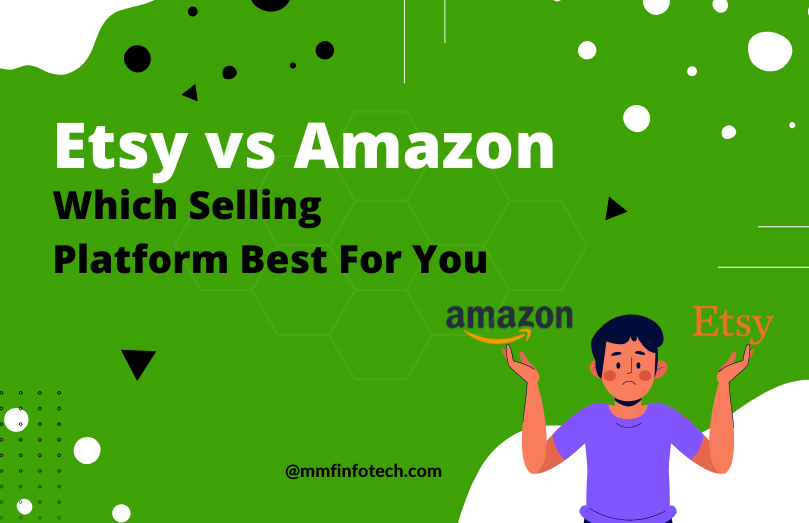Are you the one with the creative soul and unique handcrafted products to sell on online platforms? Or maybe you’re an aspiring entrepreneur looking to reach a huge number of audience with your innovative ideas? In the bustling world of online selling, two giants stand out: Etsy and Amazon. Both the platforms offer vastly different opportunities and multiple options for sellers, each with its own set of advantages and challenges.
If you’re in a confusion which selling platform is best for you, let’s focus on selling on Amazon and explore the fascinating world of Etsy vs. Amazon to discover the perfect fit for your creative endeavors and business aspirations!
Benefits and Drawbacks for Etsy Shop Owners
As an Etsy shop owner, you step into a world filled with exciting possibilities, but like any venture, it comes with its share of benefits and drawbacks.
Benefits Of Etsy Shop Owners
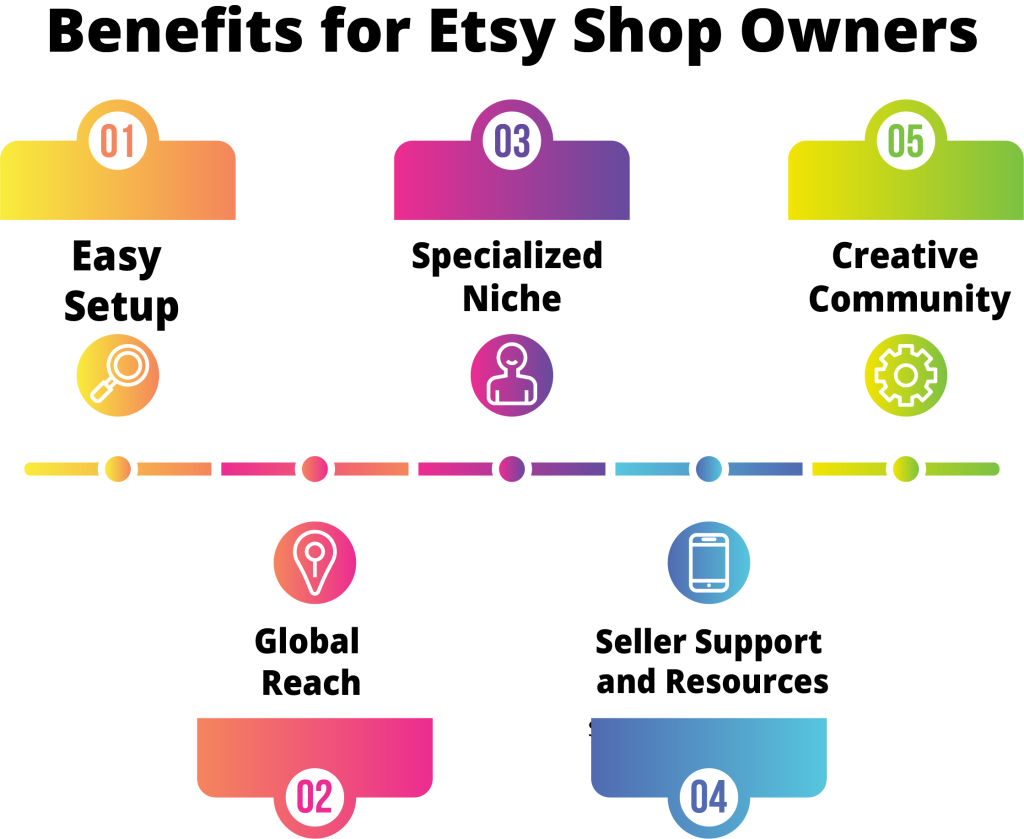
- Creative Community: One of the biggest perks of Etsy which is very common is its vibrant and supportive community of creators and crafters. You’ll connect with like-minded individuals who share the same passion for handcrafted and unique products, fostering a sense of belonging and encouragement.
- Specialized Niche: Etsy is renowned for its focus on handmade, vintage, and artisanal goods. By selling on this platform, you tap into a niche market of buyers actively seeking one-of-a-kind items, increasing the chances of finding your target audience.
- Easy Setup: Setting up an Etsy shop is relatively simple, even for beginners. You can create a store with personalized branding, add product listings, and start selling in no time.
- Global Reach: Etsy provides access to a vast international customer base. Your products can reach buyers from all around the world, expanding your market and potential sales.
- Seller Support and Resources: Etsy offers various seller resources, including analytics, marketing tips, and seller handbook, empowering you to improve your shop and boost sales.
Drawbacks Of Etsy Shop Owners
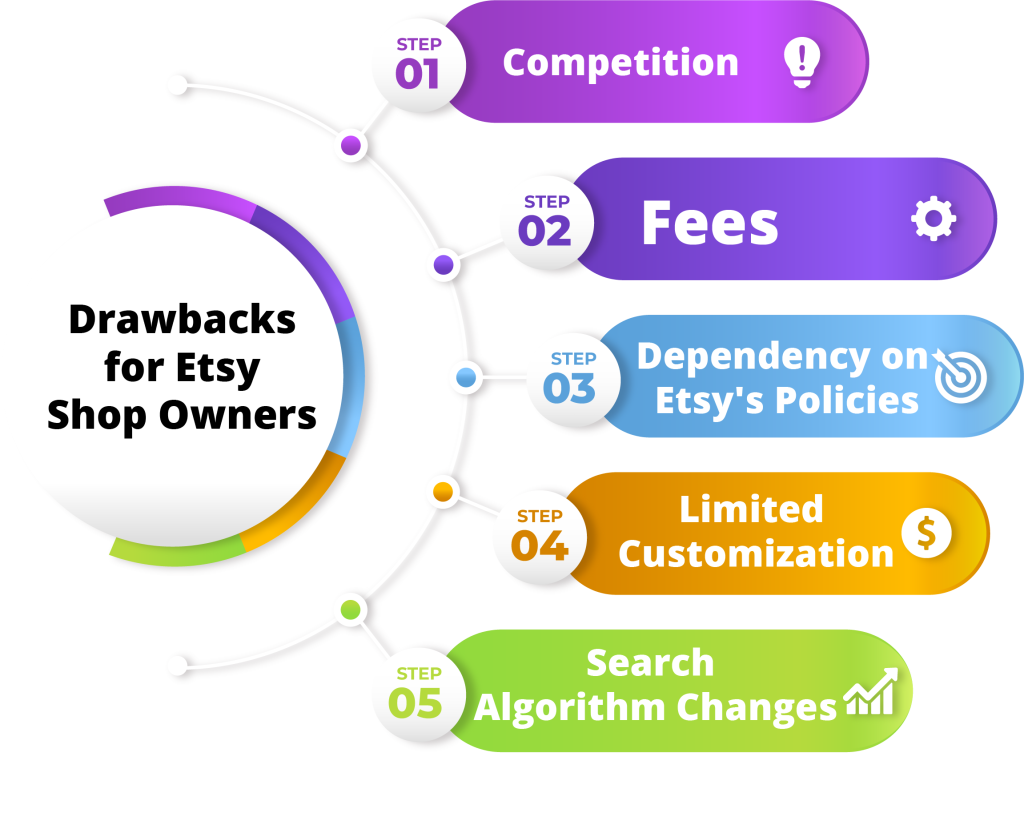
- Competition: With Etsy’s popularity comes significant competition. Standing out amidst thousands of other sellers can be a challenge, requiring strong marketing efforts and unique products.
- Fees: Etsy charges listing fees, transaction fees, and payment processing fees, which can impact your profit margins, especially for lower-priced items.
- Dependency on Etsy’s Policies: As an Etsy seller, you must adhere to the platform’s rules and policies, which may change over time. This can sometimes limit your autonomy and flexibility in running your business.
- Limited Customization: While Etsy allows some branding customization, your shop’s appearance is still constrained by the platform’s design templates, potentially limiting your ability to create a fully personalized storefront.
- Search Algorithm Changes: Etsy’s search algorithm can affect your shop’s visibility. Changes to the algorithm might impact how easily buyers find your products, requiring you to adapt your strategy accordingly.
In the world of Etsy, shop owners navigate a dynamic marketplace, balancing the platform’s unique advantages with the challenges it presents. Understanding these benefits and drawbacks is crucial in building a successful and thriving Etsy shop.
Benefits and Drawbacks for Amazon Store Owners
Being an Amazon store owner presents a thrilling journey with its own set of benefits and drawbacks.
Benefits For Amazon Store Owners
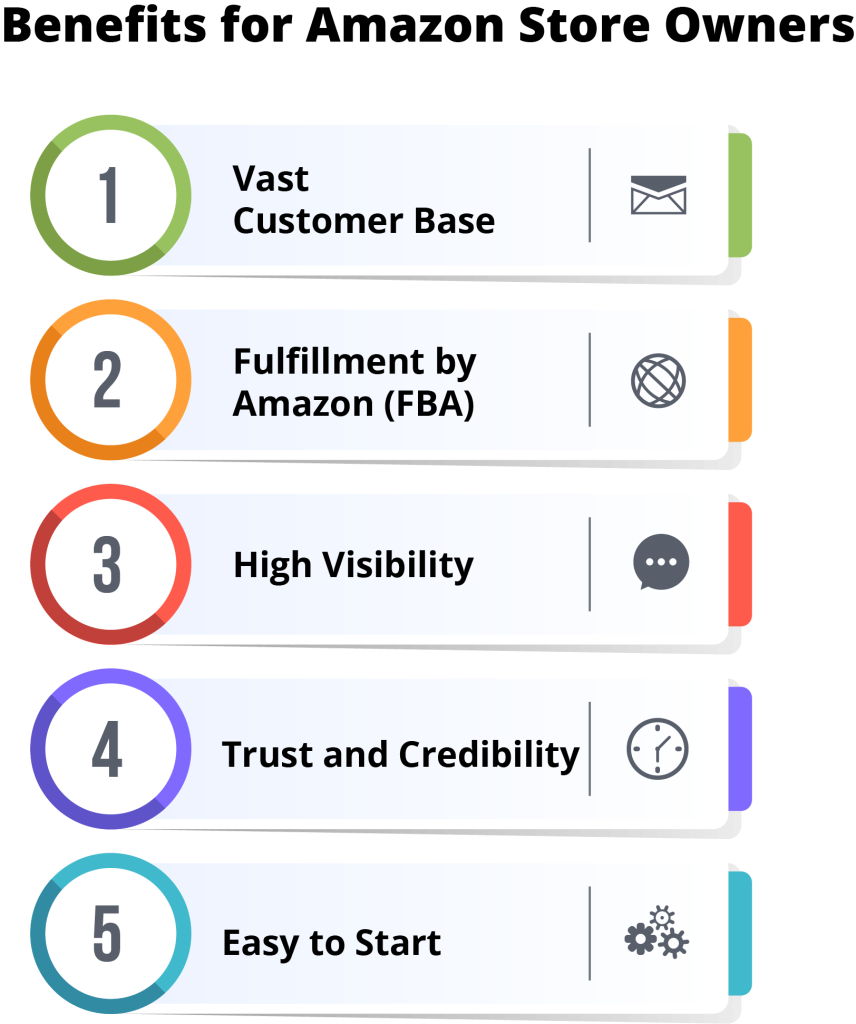
- Vast Customer Base: With millions of active users, Amazon offers unparalleled access to a massive global customer base. Your products have the potential to reach a diverse audience from all corners of the world.
- Fulfillment by Amazon (FBA): Amazon’s FBA program allows you to outsource warehousing, shipping, and customer service. This can significantly ease the logistical burden and streamline your operations.
- High Visibility: Amazon’s powerful search algorithm and recommendation system can boost your products’ visibility, increasing the chances of getting discovered by potential buyers.
- Trust and Credibility: Amazon’s reputation as a trustworthy and reliable online marketplace can instill confidence in buyers, potentially leading to increased sales.
- Easy to Start: Setting up an Amazon store is relatively straightforward, with the platform providing step-by-step guidance to get you up and running quickly.
Drawbacks of Amazon Store Owners
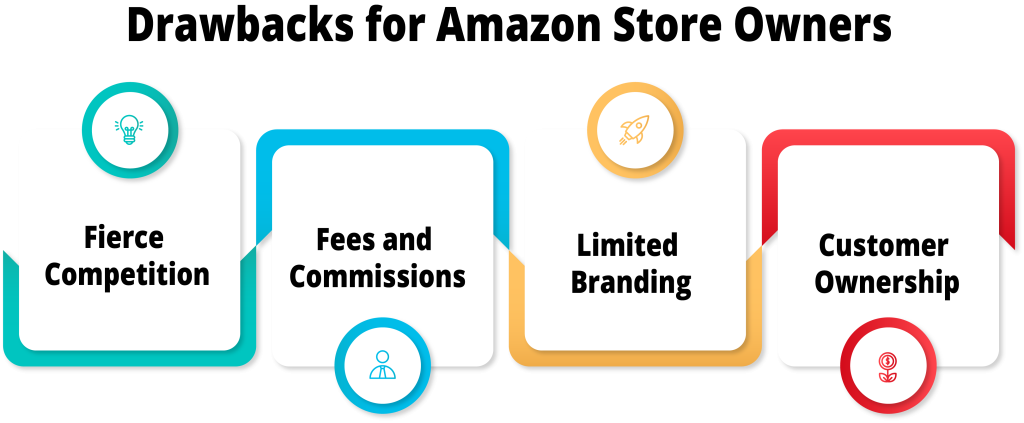
Fierce Competition: The immense popularity of Amazon attracts a vast number of sellers, resulting in intense competition. Standing out in crowded markets can be challenging, demanding innovative strategies and product differentiation.
- Fees and Commissions: Amazon charges various fees, including referral fees and FBA fees, which can impact your profit margins. Understanding and managing these costs is crucial for maintaining a profitable business.
- Limited Branding: Amazon’s standardized product listings and store layouts offer limited branding opportunities. It can be challenging to establish a unique brand identity within the constraints of the platform.
- Dependency on Amazon Policies: As an Amazon seller, you must adhere to the platform’s rules and policies. Changes in policies or account suspension can disrupt your business and require prompt resolution.
- Customer Ownership: Amazon retains customer data, making it difficult to establish direct relationships with your customers. This can hinder your ability to build a loyal customer base and engage in personalized marketing efforts.
In the dynamic world of Amazon selling, store owners navigate the complexities of the platform, capitalizing on its vast reach while addressing the challenges it presents. Weighing these benefits and drawbacks is vital in developing a successful Amazon store and making the most of its vast potential.
Difference Between the Seller Platforms on Etsy Vs Amazon
When it comes to selling platforms, Amazon and Etsy are two popular choices, each offering unique features and catering to different seller needs. Let’s explore the main variations between these platforms:
1. Product Focus
Amazon: Known as the “Everything Store,” Amazon caters to a vast range of products, from electronics and household items to books and clothing.
Etsy: Etsy specializes in handmade, vintage, and unique artisanal goods, making it a go-to platform for crafters and creators.
2. Seller Types
Amazon: Welcomes various seller types, including individual sellers, small businesses, and large enterprises.
Etsy: Primarily attracts individual artists, crafters, and small businesses specializing in handmade or vintage products.
3. Fulfillment Options
Amazon: Offers Fulfillment by Amazon (FBA) where sellers can store their products in Amazon’s warehouses, and Amazon handles shipping, customer service, and returns.
Etsy: Sellers handle their fulfillment, shipping, and customer service, though Etsy has its shipping label services.
4. Seller Fees
Amazon: Charges various fees, including referral fees, FBA fees, and subscription fees for Professional sellers.
Etsy: Charges listing fees, transaction fees, and payment processing fees.

5. Customization and Branding:
Amazon: Provides limited customization options for sellers’ storefronts, focusing more on the product presentation than branding.
Etsy: Offers some customization for shop owners, allowing them to showcase their brand identity and create personalized store aesthetics.
6. Competition
Amazon: Highly competitive due to its extensive customer base and broad product offerings.
Etsy: Competitive within its niche market, but may be easier to stand out for sellers with unique handmade or vintage products.
7. Customer Base
Amazon: Reaches a vast and diverse customer base worldwide, providing high visibility for products.
Etsy: Targets a niche market of buyers seeking handmade and vintage products, which may lead to a more engaged and dedicated customer base.
In essence, Amazon offers a vast marketplace with diverse products and a massive customer base, while Etsy caters to a specialized community of creators with a focus on handmade and unique goods. Deciding between the two platforms depends on the seller’s product offerings, business goals, and desired level of customization and fulfillment support.
The Verdict: Etsy vs Amazon
In the battle of Etsy vs. Amazon, there’s no one-size-fits-all winner. Each platform brings unique strengths and opportunities for sellers.
If you’re a creative soul passionate about handmade or vintage goods, Etsy’s specialized niche and supportive community may be the perfect fit for you. Embracing Etsy allows you to connect with like-minded individuals and target a dedicated audience seeking one-of-a-kind products.
On the other hand, if you have a diverse range of products and seek access to a massive global customer base, Amazon might be the ideal choice. Utilizing Amazon PPC management and leveraging its powerful search algorithm and fulfillment options like FBA, Amazon offers unparalleled visibility and convenience for sellers.
Ultimately, the decision between Etsy and Amazon boils down to your product offerings, business goals, and preferred level of customization and fulfillment support. Whichever platform you choose, with the right strategies and dedication, you can carve a successful path in the thriving world of online selling. So, choose wisely and embark on an exciting journey to showcase your creativity and entrepreneurial spirit to the world!

